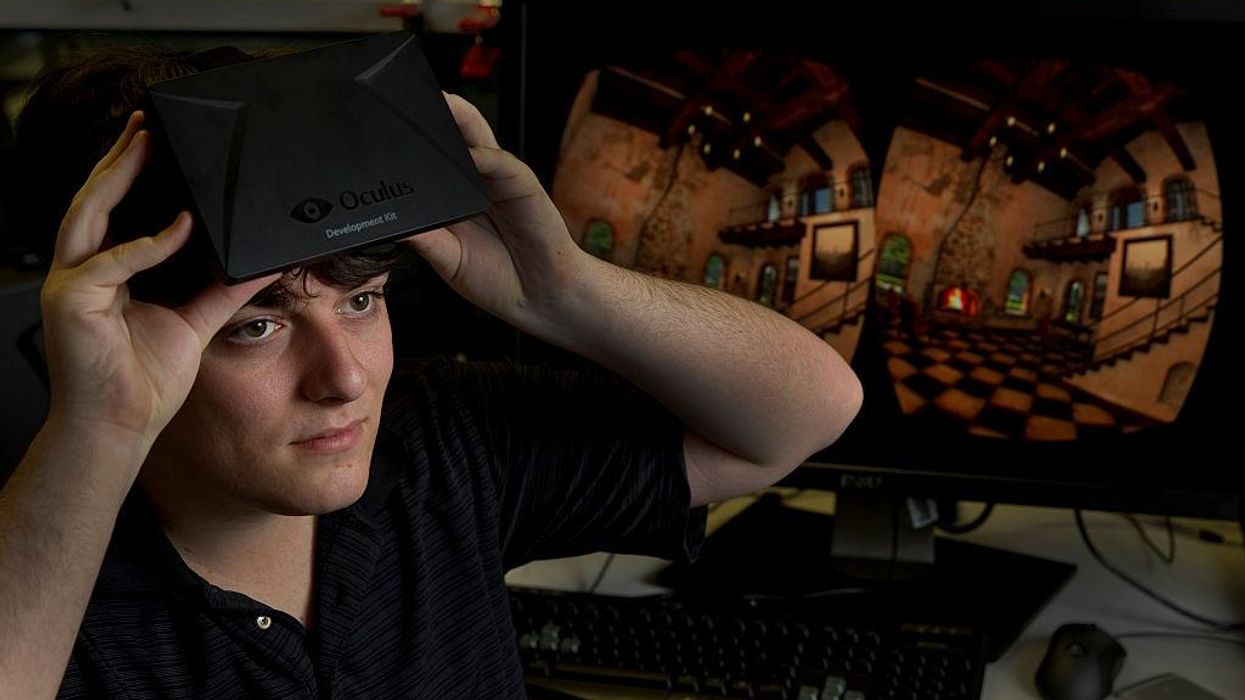
Photo by Allen J. Schaben/Los Angeles Times via Getty Images

Palmer Luckey, the billionaire founder of Oculus and military technology company Anduril, has invented a new VR headset. The device is not novel on account of better graphics or an improved frame rate, but rather because it is capable of blowing a smoking hole through the user's noggin. Should the device ever make it to market, it may be enough to prompt some gamers to reconsider playing on hard mode.
In a Sunday blog post, Luckey described the new device, which he has called "NerveGear."
NerveGear is a virtual reality headset that looks like a transmogrified Oculus Rift, only this time the black goggles have three protuberances that jut out above the eyes, which together are "capable of killing the user."
"The idea of tying your real life to your virtual avatar has always fascinated me," Luckey wrote. "You instantly raise the stakes to the maximum level and force people to fundamentally rethink how they interact with the virtual world and the players inside it."
\u201c"This might be a game, but it is not something you play."\n\nTo commemorate the Sword Art Online Incident of November 6th 2022, I made the OQPNVG, the first virtual reality device capable of killing the user - if you die in the game, you die in real life.\n\nhttps://t.co/F3nkP5EU61\u201d— Palmer Luckey (@Palmer Luckey) 1667775396
The inspiration for the suicide headset came from the Japanese novel series entitled "Sword Art Online" by Reki Kawahara, which originally ran from 2002 to 2008 and was adapted into a television series in 2012.
In the show, set in 2022, thousands of people become trapped in a virtual massively multiplayer online role-playing game on Nov. 6, 2022. The protagonist, Kirito, tries ardently to escape.
Luckey noted that if the trapped and mentally dislocated gamers' "hit points dropped to zero, their brain would be bombarded by extraordinarily powerful microwaves, supposedly killing the user."
In lieu of powerful microwaves, Luckey elected to use three explosive charge modules, each tied "to a narrow-band photosensor that can detect when the screen flashes red at a specific frequency, making game-over integration on the part of the developer very easy."
"When an appropriate game-over screen is displayed, the charges fire, instantly destroying the brain of the user," he added, noting that he has "not worked up the balls to actually use it [himself]."
Luckey stated that the "good news is that we are halfway to making a true NerveGear. The bad news is that so far, I have only figured out the half that kills you. The perfect-VR half of the equation is still many years out."
Until it is completed, the NerveGear "is just a piece of office art, a thought-provoking reminder of unexplored avenues in game design."
Luckey, a dropout from California State University, sold Oculus to Facebook for nearly $2 billion. The 30-year-old entrepreneur reportedly netted nearly $600 million of the sale. Facebook fired Luckey three years later.
The Wall Street Journal reported that Luckey's firing came after his colleagues raged about the VR wizard's $10,000 donation to anti-Hillary Clinton group Nimble America during the 2016 presidential election.
Although Facebook CEO Mark Zuckerberg testified to Congress that Luckey's departure had nothing to do with politics, it later turned out that the Oculus inventor's support for former President Donald Trump was a major factor behind his exit.
After his firing, which resulted in Luckey securing a payout of at least $100 million, he fundraised for Sen. Ted Cruz (R-Texas) and then founded the defense contractor Anduril.
CNBC reported that Anduril is behind the Anvil quadcopter drone, which can fly 100 miles per hour and was purchased by the U.S. military for use by special forces soldiers.
Luckey's company also makes the Ghost, which can weigh up to 55 pounds and hit speeds of 85 miles per hour.
Last month, the Verge detailed the company's first weapon system, a loitering munition called the ALTIUS (Agile-Launched Tactically-Integrated Unmanned System) that hovers in a designated area ahead of striking either ground or airborne targets.
According to Anduril, ALTIUS drones are able to "accomodate multiple seeker and warhead options."
The company has contracts with the Department of Defense, Department of Homeland Security, and the U.K. Royal Marines.
While NerveGear may not be braining anyone any time soon, Luckey's other inventions certainly will.